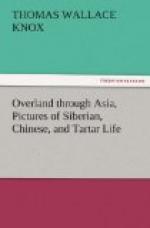The track was excellent, having been well trodden since the storm. We followed our former road a hundred versts from Barnaool, and then turned to the left to strike the great post route near Kiansk. It was necessary to cross the river Ob, and as we reached the station near it during the night, we waited for daylight. The ice was sufficiently thick and firm, but the danger arose from holes and thin places that could not be readily discovered in the dark. While crossing we met a peasant who had tumbled into one of these holes, and been fished out by his friends. He looked unhappy, and no doubt felt so. His garments were frozen stiff, and altogether he resembled a bronze statue of Franklin after a freezing rain storm.
[Illustration: AFTER THE BATH.]
The thermometer fell on the first night to fifteen degrees below zero, and to about -20 deg. just before sunrise. The colder it grew the better was our speed, the horses feeling the crisp air and the driver being anxious to complete his stage in the least time possible. With uniform roads and teams one can judge pretty fairly of the temperature by the rate at which he travels. From Barnaool we did not have the horses of the post, but engaged our first troikas of a peasant who offered his services. Our yemshick took us to his friend at the first station, and this operation was regularly repeated. Occasionally our two yemshicks had different friends, and our sleighs were separately out-fitted. When this was the case the teams were speedily attached out of a spirit of rivalry. We frequently endeavored to excite the yemshicks to the noble ambition of a race by offering a few copecks to the winner. When the teams were furnished from different houses the temper of emulation roused itself spontaneously.
Twice we left the post route to make short cuts that saved thirty or forty miles travel. On those side roads we found plenty of horses, and were promptly served. The inhabitants of the steppe are delighted at the opportunity to carry travelers at post rates. The latter are saved the trouble of exhibiting their padarashnia at every station, and generally prefer to employ private teams. The horses were small, wiry beasts of Tartar breed, and utter strangers to combs and brushes.
While at breakfast on the second morning we were accosted by an old and decrepid beggar. The fellow wore a decoration consisting of a box six or seven inches square, suspended on his breast by a strap around his neck. Though seedy enough to set up business on his own account, he explained that he was begging for the church. His honesty was evidently in question as the box was firmly locked and had an aperture in the top for receiving money. We each gave ten copecks into his hand, and I observed that he did not drop the gratuity into the box. I was reminded of the man who owed a grudge against a railroad line, and declared that the company should never have another cent of his money. A friend asked how he would prevent it, as he frequently traveled over the road.




